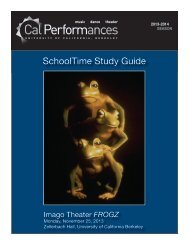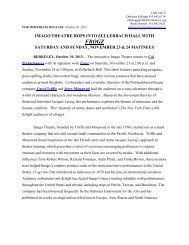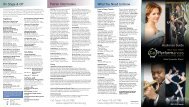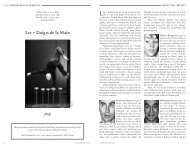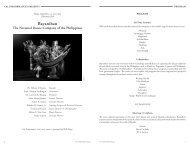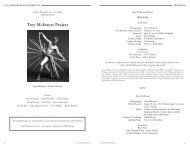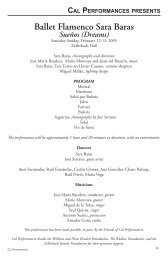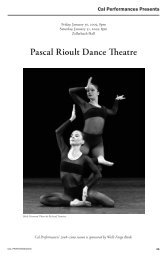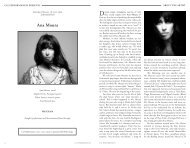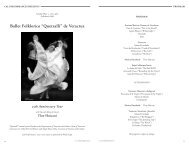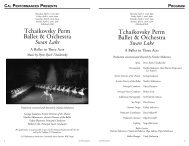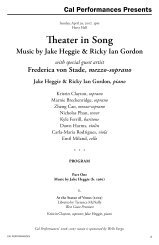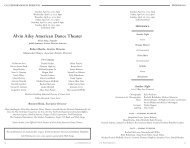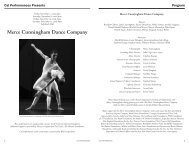Angelika Kirchschlager, mezzo-soprano ... - Cal Performances
Angelika Kirchschlager, mezzo-soprano ... - Cal Performances
Angelika Kirchschlager, mezzo-soprano ... - Cal Performances
You also want an ePaper? Increase the reach of your titles
YUMPU automatically turns print PDFs into web optimized ePapers that Google loves.
Program Notes<br />
Franz Schubert (1797–1828)<br />
Selected Songs<br />
In June 1816, when he was 19, Schubert received<br />
his first fee for one of his compositions (a now-lost<br />
cantata for the name-day of his teacher, Heinrich<br />
Watteroth), and decided that he had sufficient<br />
reason to leave his irksome teaching post at his<br />
father’s school in order to live the life of an artist.<br />
Thus began the bohemian existence of his last<br />
dozen years—living by the gladly proffered aid of<br />
friends, daily climbing up to Grinzing to haunt the<br />
cafés, avoiding the higher levels of society for dislike<br />
of buying and wearing good clothes. And music,<br />
always music. He composed incessantly. Out<br />
of bed shortly after dawn (sometimes he slept with<br />
his glasses on so as not to waste any time getting<br />
started in the morning), pouring out music until<br />
early afternoon, then off to who-knows-where for<br />
a bit too much Heuriger wine and a few pipes of<br />
cheap tobacco. Compositions filled his head all<br />
the while, sometimes scratched out on napkins<br />
or envelopes if they could not wait until the next<br />
morning. Evenings were spent making music with<br />
his devoted band of friends, who were delighted to<br />
sing and play what he wrote. Franz von Hartmann<br />
recorded of one of these Schubertiads, “There was<br />
a huge gathering [including] Gahy, who played<br />
four-hand piano music gloriously with Schubert,<br />
and Vogl, who sang almost thirty splendid songs....<br />
When the music was over, there was a grand feast<br />
and dancing. At 12:30 [we went] home. To bed at<br />
1 o’clock.” These convivial meetings were often<br />
hosted by prominent members of society, including<br />
lawyers and government officials, and were<br />
regularly attended by both professional musicians<br />
and amateurs.<br />
Schubert first met Franz Xaver von Schlechta<br />
when they were both students at the School of the<br />
Court Chapel in Vienna. Schlechta, the son of<br />
a military officer, went on to a distinguished career<br />
in public service that culminated in his being<br />
named Austria’s Finance Minister. He remained<br />
a friend and great admirer of the composer, took<br />
part in his Schubertiads, and offered him several<br />
of his own poems to be set to music. Fischerweise<br />
(“Fisherman’s Song”), composed in March 1826,<br />
8<br />
suggests both the vigorous activity and the deep<br />
contentment of the trade.<br />
Johann Gabriel Seidl (1804–1875), teacher,<br />
curator, lawyer, censor and prolific lyrical poet,<br />
had been a friend of Schubert since his youth. In<br />
1824, he tried to persuade Franz to use an opera<br />
libretto of his titled Der Kurze Mantel, but was<br />
refused. The first of Schubert’s settings of Seidl’s<br />
poems for solo voice was Der Wanderer an den<br />
Mond (“The Wanderer Addresses the Moon”) of<br />
March 1826, which was followed by ten others.<br />
Schubert presented Der Wanderer an den Mond<br />
at the Schubertiad of April 23, 1827 at the home<br />
of Joseph Witteczek, a devoted friend of his and<br />
a frequent host of the Schubertiads who amassed<br />
an important collection of Schubert’s first editions,<br />
manuscripts and press clippings. Schubert dedicated<br />
these two songs to Witteczek upon their publication<br />
by Tobias Haslinger the following year.<br />
By the time that Schubert met him, in early<br />
1819, Franz Grillparzer had become one of Austria’s<br />
most acclaimed playwrights largely through the<br />
success two years earlier of Die Ahnfrau (“The<br />
Ancestress”) at the Theater an der Wien. Composer<br />
and dramatist became friends. Grillparzer attended<br />
Schubert’s musical evenings, Schubert set three<br />
of his verses, and in 1828 Grillparzer devised the<br />
poignant motto for the composer’s tombstone:<br />
“Music has here entombed a rich treasure, but still<br />
fairer hopes.” The text for Bertas Lied in der Nacht<br />
(“Berta’s Song in the Night”), which Schubert set<br />
in February 1819, was taken from Die Ahnfrau, a<br />
tragedy about the workings of fate through an ancestral<br />
family ghost.<br />
Matthäus von Collin (1779–1824), brother of<br />
Heinrich Joseph von Collin (1771–1811), whose<br />
play Coriolan inspired one of Beethoven’s finest<br />
overtures, was a lawyer, editor, poet, dramatist<br />
and professor of aesthetics and philosophy at the<br />
University of Vienna who was so highly respected<br />
that he was entrusted with the education of<br />
Napoleon’s son, the Duke of Reichstadt. Schubert<br />
met Matthäus through Joseph von Spaun, a fellow<br />
student at the School of the Court Chapel<br />
in Vienna who became a lifelong friend and supporter.<br />
It was through his association with Collin<br />
that Schubert became known to many of the city’s<br />
CANCELED<br />
CAL PERFORMANCES<br />
fashionable music lovers, and, in appreciation,<br />
he set five of Collin’s poems, including Wehmut<br />
(“Sadness”) in 1823.<br />
Johann Ludwig Uhland (1787–1862), poet,<br />
playwright, essayist and folklorist, was one of the<br />
leading writers of Germany during Schubert’s day.<br />
Uhland was trained for a law career, and practiced<br />
that profession for a time before becoming<br />
Professor of German Literature at the University of<br />
Tübingen. Schubert set only one of Uhland’s poems,<br />
in 1820—Frühlingsglaube (“Faith in Spring,”<br />
D. 686)—but it is his most beautiful tribute to the<br />
vernal season.<br />
Ernst Konrad Friedrich Schulze lived, and made<br />
poetry, at the far edge of German Romanticism.<br />
Born in Celle in 1789 into a family of lawyers and<br />
booksellers, he was a difficult and uncommunicative<br />
child who retreated into literature and his own<br />
roiling feelings, which he began to shape into despairing,<br />
spectral, often cynical poems by the age<br />
of 15. His sexual awakening two years later, when<br />
he went to Göttingen to begin his university studies,<br />
led to an obsessive attention—“stalking,” Susan<br />
Youens called it in her study of Schubert’s Poets—<br />
toward two sisters: first Cäcilie Tychsen, and, after<br />
she died of tuberculosis in 1812, her older sister,<br />
Adelheid. Schulze volunteered to fight against<br />
Napoleon in 1814, but his fragile health quickly<br />
forced him out of active duty. He died of tuberculosis<br />
in 1817; he was 28. Schulze recorded his intense<br />
feelings in enormous diaries and long poems<br />
throughout his brief life, a number of which were<br />
published posthumously in 1822 as the Poetisches<br />
Tagebuch (“Poetic Diary”). Schubert came to know<br />
this publication early in 1825—he had considered<br />
making an opera of Schulze’s Die Bezauberte<br />
Rose (“The Enchanted Rose”) the year before, but<br />
nothing came of the idea—and he set ten of the<br />
poems during the following months. Schulze expressed<br />
his unrequited love for the Tychsen sisters<br />
in the German Romanticists’ traditional natural<br />
metaphors in Im Frühling (“In Spring”), of which<br />
Schubert made a poignant setting in 1826.<br />
Teacher, poet, editor, librarian, historian, lecturer<br />
and curator Karl Gottfried von Leitner (1800–<br />
1890) was one of the leading figures in the cultural<br />
life of his native Styria. Schubert was introduced to<br />
Program Notes<br />
his verses when Johann Schickh published some of<br />
them in his Zeitschrift für Kunst, Literatur, Theater<br />
und Mode (“Journal for Art, Literature, Theater and<br />
Fashion”) in 1822; Schubert set Leitner’s Drang<br />
in die Ferne (“Distant Urge”) early the following<br />
year. On a stay in Graz in September 1827 with his<br />
musical friends Karl and Marie Pachler, Schubert<br />
became acquainted with Leitner’s recent work, and<br />
during the following year he set ten more of his<br />
poems, including the delightful astronomical encomium,<br />
Die Sterne (“The Stars”).<br />
Andrew MacDonald (1757–1790) was called<br />
as a young man to the ministry in the Scottish<br />
Episcopal Church, but the heavy proscription on<br />
that sect following its support of the Jacobite uprisings<br />
to return the Catholic Stuart line to the<br />
throne of Great Britain drove him into penury.<br />
He took up writing poetry and dramas to make<br />
a living, but he had only just begun establishing a<br />
reputation when he died at age 33 in London, leaving<br />
his wife and young child destitute. Sometime<br />
shortly before his death, MacDonald wrote an<br />
opera libretto titled Love and Loyalty, apparently<br />
with the hope that it would be set by the British<br />
composer William Shield. The opera never reached<br />
the stage, but the libretto was published in a posthumous<br />
edition of The Miscellaneous Works of A.<br />
M’Donald. The teenage Walter Scott had met<br />
MacDonald in Edinburgh and he included some<br />
lines from Love and Loyalty in his A Legend of<br />
Montrose (1819), where they were assigned to that<br />
novel’s heroine, Anne Lyle. Schubert set the poem<br />
in a now-anonymous German adaptation in 1825<br />
as Lied der Anne Lyle.<br />
In April 1825, Ludwig Rellstab, a prominent<br />
music critic in Berlin and a writer of high ambitions,<br />
descended upon Vienna to try to convince<br />
Beethoven to set some of his poems, perhaps<br />
even one of his opera librettos. Rellstab got along<br />
as well as anyone could with the stone-deaf curmudgeon,<br />
but Beethoven never set a syllable of his<br />
poetry. (Rellstab did a little better by Beethoven,<br />
however, since it was he who described the Sonata<br />
in C-sharp minor, Op. 27, No. 2, as “a vision of<br />
a boat on Lake Lucerne by moonlight,” a sobriquet<br />
that has since inextricably attached itself to<br />
the music.) Rellstab’s poems found their way into<br />
CANCELED<br />
CAL PERFORMANCES 9



